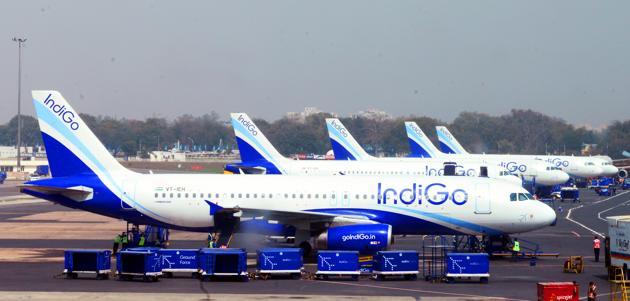IndiGo, GoAir ground 65 flights, solution to engine issue not likely before June
Around 13,000 passengers were affected by the cancellations. Both IndiGo and GoAir said they were trying to accommodate passengers in other flights.
Two Indian carriers, IndiGo and GoAir, cancelled at least 65 daily flights on Tuesday, a day after the national aviation regulator, the Directorate General of Civil Aviation (DGCA), grounded 11 Airbus A320 Neo (New Engine Option) aircraft over engine glitches.

The country’s largest carrier, IndiGo, cancelled 47 of its 1,000-odd daily flights. The airline, operated by InterGlobe Aviation, operates a fleet of 155 Airbus aircraft out of which 11 are grounded -- eight on Monday and three in February. Twenty-five of these cancelled flights were from Delhi and the rest from Chennai, Mumbai, Hyderabad, Bengaluru and other cities.
The Wadia group-run Go Air cancelled 18 flights originating from Bengaluru, Cochin, Chennai, Hyderabad, Bhubaneswar, Kolkata, Lucknow and Delhi. Three of the airlines’ aircraft were grounded on Monday.
Each Airbus A320 Neo carries around 180 passengers and it is estimated that around 13,000 passengers were affected by the cancellations. Both airlines said they were trying to accommodate passengers in other flights.
A DGCA official, who asked not to be named, said that the problem would persist at least till June as the engine manufacturer needed time to provide replacements.
The cancellation might push up ticket prices, industry insiders said. “We have seen fares of over R12,000 for a one-way Delhi-Mumbai flight for Tuesday. With current load factors at over 90%, this reduction in capacity is likely to have a 5-10% impact on fares on key routes in the short to medium term,” said Sharat Dhall, chief operating officer (B2C) at travel portal Yatra.com.
The DGCA grounded A320 Neo twin-engine aircraft powered by a particular batch (ESN No. 450) of Pratt and Whitney (P&W) engines that feature a seal that causes vibrations.
Monday’s decision came hours after a Lucknow-bound IndiGo flight was forced to return to Ahmedabad after suffering a mid-air engine failure. The DGCA has asked both airlines to not refit the engines with spares. A similar engine failure had occurred on an IndiGo flight earlier this month in Mumbai, and on February 24 a GoAir aircraft was grounded in Leh.
IndiGo had grounded three A320 Neo aircraft in February due to glitches in both engines but had been allowed to fly eight aircraft with one affected engine, though not beyond two hours.
The DGCA decision was at odds with the European Aviation Safety Agency, the primary regulator for Airbus planes, which says the jets are safe if they have a single affected engine.
“We are working closely with our customers to minimise disruption. The corrective action has been approved and we have already begun to deliver production engines with the upgraded configuration. We are working to mitigate the AOG situation by the end of the second quarter,” Pratt & Whitney said in a statement.
IndiGo said it cancelled less than 5% of its daily flights. “Our teams swiftly re-accommodated the passengers on alternate flights and fully refunded the fares to any customer who preferred that... in the meantime, our future schedules have been adjusted already and passengers informed accordingly,” the airline said in a statement.
“GoAir has complied with the DGCA directive by grounding the late serial number PW GTF engines. This has resulted in the cancellation of some flights originating out of eight centres. Flight schedules are being altered to accommodate those affected. Alternate arrangements are made or offered to minimise impact and inconvenience; in cases where appropriate, free cancellation and re-booking options have been made available,” the airline spokesperson said.
Air India and Vistara also fly the A320 Neo aircraft, but those are powered by CFM engines, made by a joint venture between General Electric Co. and France’s Safran Aircraft Engines SAS. There are 45 A320 Neo aircraft in India with P&W engines, of which 31 are in operation.
(with inputs from PTI and Bloomberg)






